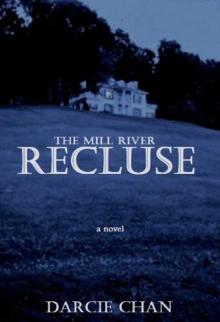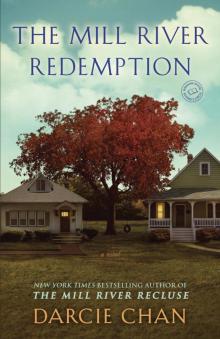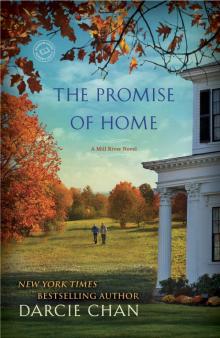- Home
- Darcie Chan
The Mill River Recluse Page 34
The Mill River Recluse Read online
Page 34
“I know,” Father O’Brien replied, chuckling.
“Well, look, I was actually on my way to the station—I’ve got to relieve Wykowski, so I should get going, but if you ever need help lifting any other boxes of lead, or, uh, whatever you’ve got in there, give me a call. I’d be glad to help you out.”
Father O’Brien smiled. “Thanks, Kyle, I’ll do that.”
The clerk appeared behind the counter as Kyle left. Father O’Brien turned around to face her.
“I’d like to send this bulk rate,” he said.
“You mean parcel post?”
“Yes, if that’s the cheapest. It’s pretty heavy. And could you put some more tape across the bottom seam?”
With a strong effort, the clerk managed to slide the package across the counter onto the scale. “Fifty-six pounds and twelve ounces,” she said. “Is there anything hazardous or perishable in there?” She produced a large roll of tape and used it to reinforce the bottom of the box.
“Oh, no.”
“You need any insurance or delivery confirmation on it?”
“Can I just get the delivery confirmation?” He couldn’t imagine what price he would put on the box for insurance purposes. The delivery confirmation, though, would be a comforting thing.
“With parcel post, you can only get the confirmation if you purchase insurance.”
He thought for a moment. “I guess I could insure it for a hundred dollars,” he said. For anyone but himself, even that amount would probably seem too high for a box of assorted spoons.
The clerk was punching numbers into her computer. “Okay, then. Your total comes to thirty-seven dollars and twenty-two cents.”
Father O’Brien handed her two twenty-dollar bills. He reread the address on the box one last time. The black lettering was neatly printed: Saturday’s Bread Soup Kitchen, Church of All Nations, 333 Tremont St., Boston, MA, 02116. He remembered writing that address on the box, all the while hoping, knowing, that his spoons would be used and appreciated. There were always so many hungry people in big cities like Boston. He touched the box, the mailing tape reinforcing the seams, the corner where he had included his own return address. His chin trembled and he blinked several times. He would never see his spoons again.
“Father? Here’s your change, Father.” The clerk held the bills and coins out to him. “Shouldn’t take any longer than five to seven business days to get there, but it’ll probably be more like two days since Massachusetts is pretty close to here.”
“Thank you,” he said. He blinked again and took a step back. The clerk tried to lift the box, then called into the back room for someone to help. A burly, bearded man in a post office uniform came puffing around the corner. Father O’Brien watched as the two eased the box down from the counter and into a rolling cart. The man pushed the cart away with him into the back room.
Father O’Brien turned toward the door. “Have a nice day,” the clerk called to him, but he barely heard her.
It was over.
The sun broke through the clouds as he left the post office. As he stood outside the brick building, a thin ray fixed directly on his balding head, illuminating the few scant hairs that refused to be combed flat. He felt the warmth of the ray spreading throughout him. He had done what was right. All his life, he had tried and tried to do what was right. He had kept his word, honored the people he served, revered the God he worshipped. Thanks to Mary, he looked forward to his next visit to the confessional. He had finally overcome his greatest sin.
The sunshine on his head was a sign, he was certain.
He and Daisy still had to plan a memorial service for Mary. It would be in the early springtime, during sapsicle season. It would be a private service, with only himself, Daisy, and maybe a few others attending. He would scatter her ashes on her father’s farm, beneath the sweet icicles, where she had been so happy in her youth.
After that, what would he do with the rest of his life? He would turn eighty-seven in a few weeks, but how much longer would he live? That would be uncertain until the end, but this much he did know: he would always help people. He would eat tart cherry pie. He would remember Mary, her strength and acceptance and generosity, and keep an eye on her daughter. He would never steal again but would admire spoons from a distance. Most of all, he would continue to do the best he could.
That, especially, was all anyone could do.
~~~
Dedication
To my husband, Tim, my son, Gavin, my family, and the extraordinary Ruth Uyesugi, my teacher, “other mother,” and dear friend.
Acknowledgments
Many people gave the generous gift of time by reading early drafts of this book and improving it through their critique and encouragement. Thanks to “test-readers” Tim and Beverly Trushel, Tess Alleyne, Susan Dunbar, Michelle Johnson-Weider, Heather Burnham, Diane Nesmeyer, Heather Lowell, Gary Endicott (who also explained the nuances of Molotov cocktails), Matt McGhie, Janell Bentz, Janine Johnson, Anne Williams, Patricia Clements, Barry Gold, and Kristin Banks, my aunt Sheila Wheeler, and my cousins Shannon McCracken and Angela Hawkins. Also, thanks to Polly Craighill for her enthusiasm and to fellow writer Eric Shufflebarger for his camaraderie and wicked sense of humor.
I would like to thank Robert Pye of the Vermont Marble Museum, for sharing his expertise in the history of the Vermont marble industry, and Jim Simonds and Carol Wagner of the Building and Zoning Department, City of Rutland, Vermont, for information relating to fire damage of public buildings. Thanks also Chris Kiefer of the Rutland County Sheriff’s Office for taking the time to answer my questions about small-town police departments, and to PFC Mark Baxter with the Howard County, Maryland, Department of Police for explaining police procedure for responding to burglaries in progress.
I am continually grateful for the patience, support, advice, and encouragement of my wonderful literary agent, Laurie Liss.
A special thank you to the people closest to me -- my law school classmates and “brunch buddies” Tammy Baxter and Michele Knorr, and to my longtime friends Ruth Uyesugi, Angie Swedhin, Deidre Woods, Sherri Miller, and Elizabeth San Miguel. I am also grateful for the unwavering support and enthusiasm of my immediate family -- my mother Linda Tomasallo, father and stepmother Dennis and Susan Tomasallo, sisters Carrie and Molly Tomasallo, and grandmother Helen Richardson.
Finally, a special thank you to my husband, Tim, for reading new passages even after sleepless nights on call at the hospital, for maintaining and upgrading my computer and other technology necessary for my writing, and for always, always believing in me.

 The Mill River Recluse
The Mill River Recluse The Mill River Redemption
The Mill River Redemption The Promise of Home
The Promise of Home